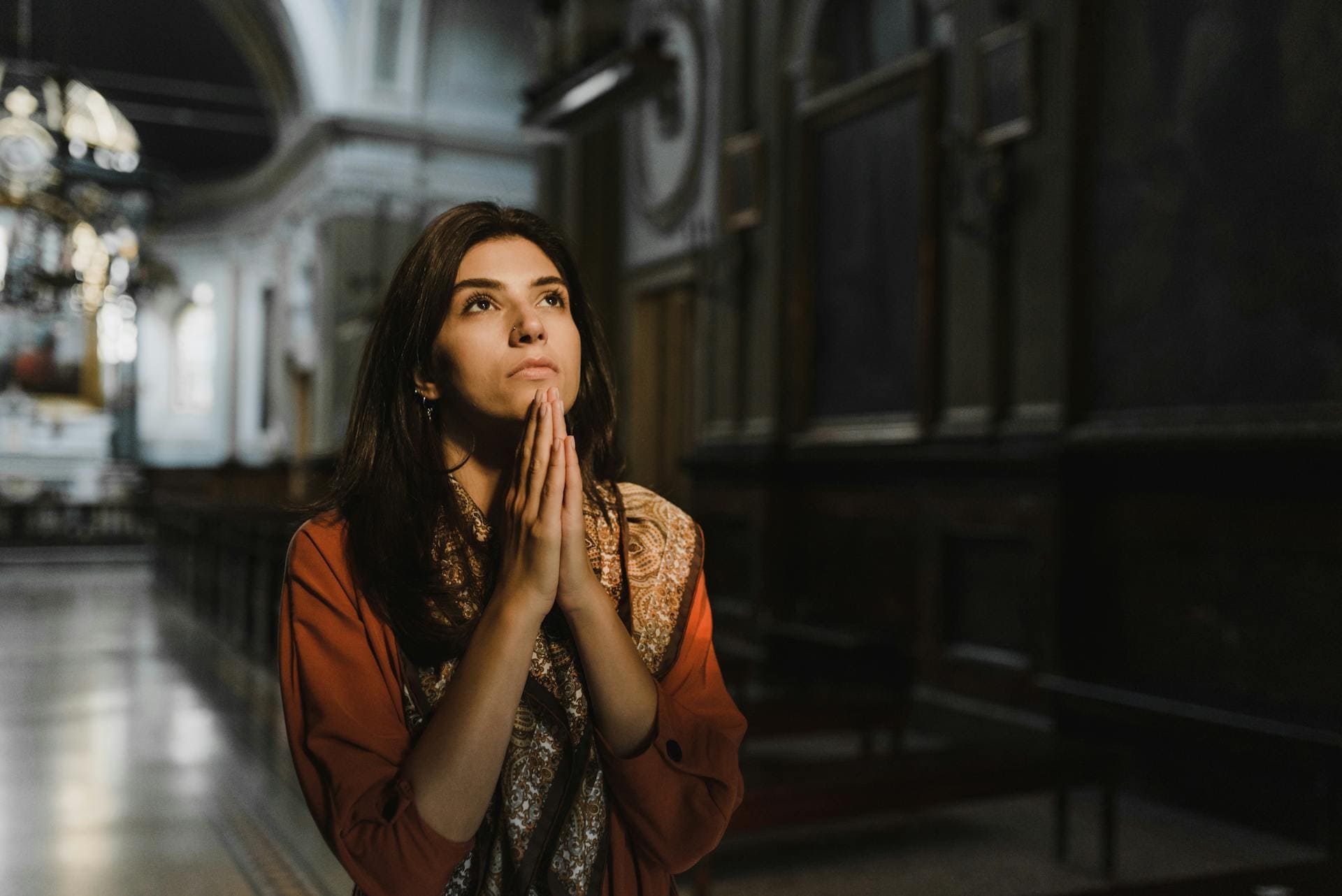The Catholic religion is one of the largest Christian denominations in the world, with over 1.3 billion members.
It is a monotheistic religion, meaning that Catholics believe in one God, who is the creator of everything.
The Catholic God has three aspects, known as the Trinity, which includes God the Father, God the Son, and God the Holy Spirit.
Catholic beliefs are based on the Bible, sacred tradition, and the teachings of the Magisterium, which is the Church’s teaching authority.
The core beliefs of the Catholic faith are found in the Nicene Creed, which states the belief in one God, the Father almighty, maker of heaven and earth, and in one Lord Jesus Christ, the only Son of God, born of the Father before all ages.
As one of the oldest and most influential religious institutions in the world, the Catholic Church has a rich history and a complex set of beliefs and practices.
In this article, we will provide a comprehensive guide to Catholic beliefs, covering everything from the nature of God and the role of Jesus Christ to the sacraments, the saints, and the afterlife.
Whether you are a Catholic looking to deepen your understanding of your faith or a non-Catholic seeking to learn more about this religion, this guide will provide you with a complete overview of Catholic beliefs.
- What are Catholic Beliefs?
- The Nicene Creed
- The Sacraments
- The Ten Commandments
- The Beatitudes
- The Virtues
- The Cardinal Virtues
- The Theological Virtues
- The Capital Virtues
- The Gifts of the Holy Spirit
- The Fruits of the Holy Spirit
- The Works of Mercy
- The Seven Deadly Sins
- Complete List Of Catholic Beliefs
- Conclusion
What are Catholic Beliefs?
The Catholic Church is a Christian religion that is monotheistic, meaning that Catholics believe that there is only one supreme being, called God.
Catholics believe that God is the creator of the universe and that He is the lord of heaven and earth. The Catholic God has three aspects, known as the Trinity. The three persons of the Trinity are God the Father, God the Son, and God the Holy Spirit.
Catholics believe that Jesus Christ is the Son of God and the savior of mankind. They believe that Jesus was born of the Virgin Mary, was crucified, died, and buried, and then rose from the dead on the third day.
Catholics believe that through His death and resurrection, Jesus redeemed mankind from sin and opened the gates of heaven to those who believe in Him.
The core beliefs of the Catholic faith are found in the Nicene Creed. This creed proclaims belief in the Holy Trinity; the Incarnation, Passion, and Resurrection of Christ; the Second Coming and Last Judgment; the forgiveness of sins; and the life everlasting.
Catholics also believe in the Seven Sacraments, which are outward signs of inward grace established by Jesus Christ, and in the intercession of the saints, who are believed to be in heaven and able to intercede on behalf of the faithful on earth.
The Nicene Creed
The Nicene Creed is a statement of faith that is recited by Catholics during Mass. It is a summary of the essential beliefs of the Catholic Church and is considered one of the most important creeds in Christianity.
The Nicene Creed was first adopted at the Council of Nicaea in 325 AD and revised at the Council of Constantinople in 381 AD.
The Nicene Creed is divided into three sections. The first section focuses on the nature of God the Father, the second section focuses on the nature of Jesus Christ, and the third section focuses on the nature of the Holy Spirit.
The Creed affirms the belief in one God, who is the creator of all things, and in Jesus Christ, who is the Son of God and the savior of the world.
Here is the full text of the Nicene Creed:
| I believe in one God, | the Father almighty, | maker of heaven and earth, | of all things visible and invisible. |
| I believe in one Lord Jesus Christ, | the Only Begotten Son of God, | born of the Father before all ages. | God from God, Light from Light, |
| true God from true God, | begotten, not made, consubstantial | with the Father; | through him all things were made. |
| For us men and for our salvation | he came down from heaven, | and by the Holy Spirit was incarnate | of the Virgin Mary, |
| and became man. | For our sake he was crucified | under Pontius Pilate, | he suffered death and was buried, |
| and rose again on the third day | in accordance with the Scriptures. | He ascended into heaven | and is seated at the right hand |
| of the Father. | He will come again in glory | to judge the living and the dead | and his kingdom will have no end. |
| I believe in the Holy Spirit, | the Lord, the giver of life, | who proceeds from the Father and the Son, | who with the Father and the Son |
| is adored and glorified, | who has spoken through the prophets. | I believe in one, holy, catholic | and apostolic Church. |
| I confess one Baptism | for the forgiveness of sins | and I look forward to the | resurrection of the dead, |
| and the life of the world to come. | Amen. |
The Nicene Creed is an important part of the Catholic faith and is recited by Catholics during Mass as a statement of their beliefs.
It affirms the belief in the Holy Trinity, the divinity of Jesus Christ, and the importance of the Church as a community of believers.
The Creed serves as a reminder of the essential teachings of the Catholic Church and helps to strengthen the faith of its followers.
The Sacraments
The Catholic Church believes in seven holy sacraments, which are seen as channels of divine grace instituted by Christ.
Each sacrament is celebrated with a visible rite, which reflects the invisible, spiritual essence of the sacrament.
Whereas some sacraments are received only once, others require active and ongoing participation to foster the spiritual growth of the individual.
The seven sacraments are:
- Baptism: the first sacrament of initiation, which cleanses the soul of original sin and welcomes the individual into the Church.
- Confirmation: the second sacrament of initiation, which strengthens the individual’s faith and commitment to the Church.
- Eucharist: the sacrament of the Body and Blood of Christ, which nourishes the soul and unites the individual with the Church and with Christ.
- Penance: the sacrament of reconciliation, which allows the individual to confess their sins and receive absolution from a priest.
- Anointing of the Sick: the sacrament of healing, which provides spiritual and physical comfort to those who are ill or suffering.
- Holy Orders: the sacrament through which men are ordained as deacons, priests, or bishops to serve the Church.
- Marriage: the sacrament of union between a man and a woman, which reflects the union between Christ and the Church.
Each sacrament is a visible sign of an inward grace, instituted by Christ himself. Through the sacraments, God shares his holiness with us so that we, in turn, can make the world holier. The Catholic Church believes that the sacraments are essential to the spiritual growth and well-being of the individual, and that they provide a tangible way to experience God’s grace and love.
The Ten Commandments
The Ten Commandments are considered the foundation of the Catholic faith. They are a set of moral principles that God gave to Moses on Mount Sinai.
The Ten Commandments guide Catholics on how to live a righteous life and form the basis for Catholic moral teaching. Here is a list of the Ten Commandments as presented by the Catholic Church:
- I am the Lord thy God: thou shalt not have strange gods before me.
- Thou shalt not take the name of the Lord thy God in vain.
- Remember to keep holy the Lord’s Day.
- Honor thy father and thy mother.
- Thou shalt not kill.
- Thou shalt not commit adultery.
- Thou shalt not steal.
- Thou shalt not bear false witness against thy neighbor.
- Thou shalt not covet thy neighbor’s wife.
- Thou shalt not covet thy neighbor’s goods.
The first three commandments focus on our relationship with God. They teach us to put God first, to honor His name, and to keep the Sabbath day holy.
The fourth to tenth commandments focus on our relationship with others. They teach us to honor our parents, not to kill, commit adultery, steal, lie, or covet what belongs to others.
Catholics believe that the Ten Commandments are not just a set of rules to follow, but rather a way of life that leads to true happiness and fulfillment.
By following these commandments, Catholics believe that they can live a life that is pleasing to God and that leads to eternal life.
The Ten Commandments are a reminder that our actions have consequences and that we are accountable for our choices.
The Beatitudes
The Beatitudes are a set of teachings by Jesus Christ that are found in the Sermon on the Mount in the Gospel of Matthew.
They describe the qualities of a person who is blessed by God and who will inherit the Kingdom of Heaven.
The Beatitudes are also referred to as the “blessings” that Jesus bestows upon his followers.
The eight Beatitudes are:
- Blessed are the poor in spirit, for theirs is the kingdom of heaven.
- Blessed are those who mourn, for they will be comforted.
- Blessed are the meek, for they will inherit the earth.
- Blessed are those who hunger and thirst for righteousness, for they will be filled.
- Blessed are the merciful, for they will be shown mercy.
- Blessed are the pure in heart, for they will see God.
- Blessed are the peacemakers, for they will be called children of God.
- Blessed are those who are persecuted because of righteousness, for theirs is the kingdom of heaven.
The Beatitudes are often seen as a guide to living a Christian life. They teach us to be humble, compassionate, and just. They also remind us that we should strive for righteousness and seek peace.
The Beatitudes are not meant to be taken as a checklist, but rather as a way of life. They are a call to action, to live a life of service to others and to God.
By following the Beatitudes, we can become more Christ-like and fulfill our purpose as Christians.
The Virtues
Catholicism emphasizes the importance of virtues, which are like habits that need to be practiced and can be lost if neglected. There are three categories of virtues in the Catholic Church: the Cardinal Virtues, the Theological Virtues, and the Capital Virtues.
The Cardinal Virtues
The Cardinal Virtues, also known as moral or human virtues, can be acquired and honed through the practice of habit. There are four main Cardinal Virtues:
| Prudence | Good judgment, wisdom, and practicality in decision-making |
| Justice | Fairness and respect for the rights and dignity of all people |
| Fortitude | Mental and emotional strength to persevere through difficulties and challenges |
| Temperance | Self-control and moderation in all aspects of life |
The Theological Virtues
The Theological Virtues are called so because they come from God and lead to God. There are three Theological Virtues:
- Faith
- Hope
- Charity (Love)
These virtues are infused into the soul at baptism and enable a person to participate in the divine life of God.
The Capital Virtues
The Capital Virtues, also known as the Deadly Sins, are vices that are the source of other sins. There are seven Capital Virtues:
- Lust
- Gluttony
- Greed
- Sloth
- Wrath
- Envy
- Pride
These vices are to be avoided at all costs as they lead to spiritual death and separation from God.
The Gifts of the Holy Spirit
The Gifts of the Holy Spirit are an essential part of Catholic belief. According to Catholic Tradition, there are seven gifts of the Holy Spirit: wisdom, understanding, counsel, fortitude, knowledge, piety, and fear of God.
These gifts are bestowed upon the faithful at Baptism and strengthened at Confirmation. The first gift, wisdom, is the ability to discern the will of God and to see things from a divine perspective.
It is grounded in common sense and comes from life experience. The second gift, understanding, is the ability to comprehend the deeper meaning of the teachings of the Church.
It allows us to see the bigger picture and to connect the dots between different aspects of our faith. The third gift, counsel, is the ability to make good decisions and to seek guidance from the Holy Spirit.
It helps us to understand the difference between right and wrong and to make choices that align with God’s will. The fourth gift, fortitude, is the strength to persevere in times of difficulty and to remain steadfast in our faith. It gives us the courage to stand up for what is right, even when it is not easy.
The fifth gift, knowledge, is the ability to understand the mysteries of faith and to seek deeper knowledge of God. It helps us to recognize the truth and to reject falsehood.
The sixth gift, piety, is the desire to worship God and to live a life of holiness. It allows us to see the beauty in God’s creation and to appreciate the goodness of others.
Finally, the seventh gift, fear of God, is not a fear of punishment but a deep respect and reverence for the power and majesty of God. It helps us to recognize our own limitations and to submit ourselves to God’s will.
In conclusion, the Gifts of the Holy Spirit are an essential part of Catholic belief. They allow us to live a life of holiness and to discern God’s will in our lives.
By cultivating these gifts, we can deepen our relationship with God and live a life of purpose and meaning.
The Fruits of the Holy Spirit
The Fruits of the Holy Spirit are the observable behaviors of people who have allowed the grace of the Holy Spirit to be effective in them.
These fruits are listed in the tradition of the Catholic Church and are based on the Latin Vulgate, a 4th-century Latin translation of the Bible.
The 12 fruits are:
- Charity
- Joy
- Peace
- Patience
- Kindness
- Goodness
- Generosity
- Gentleness
- Faithfulness
- Modesty
- Self-control
- Chastity
These fruits are not just individual virtues, but they are also interconnected. They are the result of the Holy Spirit working in the lives of believers and helping them to grow in holiness.
The fruits of the Holy Spirit are different from the gifts of the Holy Spirit, which are given to individuals to help them fulfill their mission in the Church.
Charity is the first and most important fruit of the Holy Spirit. It is the love of God and love of neighbor that motivates us to do good deeds for others.
Joy is the second fruit, and it is the happiness that comes from knowing and loving God. Peace is the third fruit, and it is the inner calm that comes from trusting in God’s love and providence.
Patience, kindness, goodness, and generosity are fruits that help us to relate to others in a positive way. Gentleness is the fruit that helps us to be humble and compassionate towards others.
Faithfulness is the fruit that helps us to be loyal to God and to others. Modesty is the fruit that helps us to be humble and respectful of ourselves and others. Self-control and chastity are fruits that help us to control our desires and passions.
The fruits of the Holy Spirit are not just for our own benefit, but they are also for the benefit of others. They help us to be better disciples of Christ and to witness to the love of God in the world. As we grow in these fruits, we become more like Christ and are better able to serve others in his name.
The Works of Mercy
The Works of Mercy are a set of charitable actions and attitudes that help us to serve our neighbors in their physical and spiritual needs. These works are an essential part of Catholic beliefs and have been practiced for centuries.
There are two types of works of mercy – corporal and spiritual. The corporal works of mercy focus on the physical needs of our neighbors.
These works include feeding the hungry, giving drink to the thirsty, clothing the naked, sheltering the homeless, visiting the sick, visiting the imprisoned, and burying the dead.
These works are based on Jesus’ teachings and examples in the Gospels, where he showed compassion and care for those in need.
The spiritual works of mercy focus on the spiritual needs of our neighbors. These works include instructing the ignorant, counseling the doubtful, admonishing the sinner, comforting the sorrowful, forgiving injuries, bearing wrongs patiently, and praying for the living and the dead.
These works help us to show compassion, empathy, and understanding towards others, and to help them grow in their faith. Both types of works of mercy are essential to our spiritual growth and development as Catholics.
By practicing these works, we can show love and compassion to our neighbors, as well as grow in our own faith and understanding of God’s love for us.
In summary, the Works of Mercy are an essential part of Catholic beliefs and practices. They help us to serve our neighbors in both physical and spiritual ways, and to grow in our own faith and understanding of God’s love for us.
By practicing these works, we can become more compassionate, empathetic, and loving towards others, and can help to build a more just and loving world.
The Seven Deadly Sins
In Catholicism, the Seven Deadly Sins are considered to be the root of all sins and vices. They are called “deadly” because they can lead to spiritual death and eternal damnation.
The Seven Deadly Sins are:
- Pride
- Envy
- Wrath
- Sloth
- Greed
- Gluttony
- Lust
Each of these sins is believed to lead to other sins and vices. For example, pride can lead to arrogance, envy can lead to jealousy, wrath can lead to violence, sloth can lead to laziness, greed can lead to theft, gluttony can lead to excess, and lust can lead to sexual immorality.
According to Catholic teaching, the Seven Deadly Sins are not only harmful to the individual who commits them, but also to society as a whole. They are seen as a hindrance to spiritual growth and a barrier to a closer relationship with God.
The Catholic Church teaches that the best way to overcome the Seven Deadly Sins is through prayer, fasting, and acts of charity.
By focusing on these spiritual practices, individuals can develop virtues such as humility, kindness, and self-control, which can help them overcome their sinful tendencies.
Complete List Of Catholic Beliefs
Here are the main beliefs and practices of Catholics:
- The Holy Trinity
- Jesus Christ
- The Church
- The Sacraments
- Mary and the Saints
- The Bible
- The Eucharist
- Prayer and Devotion
- Social Teaching
- The Rosary
- Confession/Penance
- Holy Days of Obligation
- Catholic Social Teaching
- Apostolic Succession
- The Magisterium
- Advent and Christmas
- Lent and Easter
- Confirmation
- Marriage and Family
- Catholic Education
It’s important to note that these beliefs and practices are not ranked in any particular order, and there are many other aspects of Catholicism that are important as well.
Conclusion
In conclusion, Catholicism is a complex and diverse religion with a rich history and a wide range of beliefs and practices.
Throughout its history, the Catholic Church has been a major force in shaping Western civilization and has contributed to the development of art, music, philosophy, and theology.
At its core, Catholicism is centered around the belief in one God who is the creator of all things. The Catholic Church also places a great deal of emphasis on the importance of the sacraments, which are seen as a means of receiving God’s grace and strengthening one’s relationship with Him.
Throughout the centuries, the Catholic Church has also developed a highly sophisticated theology and an elaborate system of beliefs and practices.
These include beliefs about the nature of God, the role of Mary and the saints, the importance of the Bible, and the significance of the sacraments.
Overall, Catholicism is a complex and multifaceted religion that has played a significant role in shaping the world we live in today.
Whether you are a devout Catholic or simply interested in learning more about this fascinating religion, there is much to discover and explore within the rich and diverse traditions of Catholicism.







